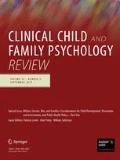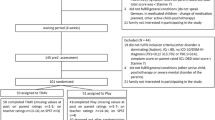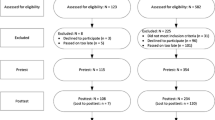Abstract
The prevention of aggressive and delinquent behavior during childhood and adolescence is one of the highest priorities for public health and crime prevention. The most common approach to preventing or treating these conduct problems has been to provide interpersonal skills training to the affected youth. This paper reviews all randomized controlled trials evaluating interpersonal skills training programs as an intervention to reduce conduct problems. Research shows that such programs have weak empirical support as isolated interventions. An alternative evidence-based system of care is described. Such a system would include behavioral parent training and behavioral classroom-based interventions for young children at risk of developing problems, as well as multisystemic family therapy or multidimensional treatment foster care for chronic delinquents. Within such a network of services, interpersonal skills training could play an important supportive role. Such a system holds the greatest promise for reducing the prevalence of aggressive and delinquent behavior in communities.
Similar content being viewed by others
REFERENCES
Bank, L., Marlowe, J. H., Reid, J. B., & Patterson, G. R. (1991). A comparative evaluation of parent-training interventions for families of chronic delinquents. Journal of Abnormal Child Psychology, 19, 15-33.
Bierman, K. L., Miller, C. L., & Stabb, S. D. (1987). Improving the social behavior and peer acceptance of rejected boys: Effects of social skill training with instructions and prohibitions. Journal of Consulting and Clinical Psychology, 54, 208-216.
Biglan, A. (1995). Changing cultural practices: A contextualist framework for intervention research (464 pp.). Reno, NV: Context Press.
Biglan, a., & Metzler, C. W. (1998). A public health perspective for research on family-focused interventions. In R. S. Ashery, E. B. Robertson, & K. L. Kumpfer (Eds.), Drug abuse prevention through family interventions. NIDA Research Monograph 177, NIH Publication NO. 994135 (pp. 430-458). Washington, DC: National Institute on Drug Abuse.
Biglan, A., Mrazek, P. J., & Carnine, D. (in press). Strategies for translating research into practice. American Psychologist.
Borduin, C. M., Henggeler, S. W., Blaske, D. M., & Stein, R. J. (1990). Multisystemic treatment of adolescent sexual offenders. International Journal of Offender Therapy and Comparative Criminology, 34, 105-113.
Brestan, E. V., & Eyberg, S. M. (1998). Effective psychosocial treatments of conduct-disordered children and adolescents: 29 years, 82 studies, and 5,272 kids. Journal of Clinical Child Psychology, 27, 180-189.
Camp, B. W., Blom, G. E., Hebert, F., & van Doorninck, W. J. (1977). “Think Aloud”: A program for developing self control in young aggressive boys. Journal of Abnormal Child Psychology, 5, 157-169.
Chamberlain, P. (1994). Family connections: A treatment foster care model for adolescents with delinquency. Eugene: Castalia Publishing Company.
Chamberlain, P., & Reid, J. B. (1998). Comparison of two community alternative to incarceration for chronic juvenile offenders. Journal of Consulting and Clinical Psychology, 66, 624-633.
Connell, S., Sanders, M. R., & Markie-Dadds, C. (1997). Self-directed behavioral family intervention for parents of oppositional children in rural and remote areas. Behavior Modification, 21, 379-408.
Dishion, T. J., & Patterson, G. R. (1992). Age effects in parent training outcome. Behavior Therapy, 23, 719-729.
Dolan, L. J., Kellam, S. G., Brown, C. H., & Werthamer-Larsson, L. (1993). The short-term impact of two classroom-based preventive interventions on aggressive and shy behaviors and poor achievement. Journal of Applied Developmental Psychology, 14, 317-345.
Dolan, L., Turkkan, J., Werthamer-Larson, L., & Kellam, S. G. (1989). The Good Behavior Game training manual. Baltimore, MD: The Johns Hopkins Prevention Research Center.
Eddy, J. M., Reid, J. B., & Fetrow, R. A. (in press). An elementary school-based prevention program targeting modifiable antecedents of youth delinquency and Violence: Linking the Interests of Families and Teachers (LIFT). Journal of Emotional and Behavioral Disorders.
Fagot, B. I., Loeber, R., & Reid, J. B. (1988). Developmental determinants of male-to-female aggression. Violence in intimate relationships (pp. 91-105). Costa Mesa, CA: Pma Publishing.
Feindler, E. L., Marriott, S. A., & Iwata, M. (1984). Group anger control training for junior high school delinquents. Cognitive Therapy and Research, 8, 299-311.
Forman, S. G. (1980). A comparison of cognitive training and response cost procedures in modifying aggressive behavior of elementary school children. Behavior Therapy, 11, 594-600.
Greenberg, M. T., Kusche, C. A., Cook, E. T., & Quamma, J. P. (1995). Promoting emotional competence in school-aged children: The effects of the PATHS curriculum. Development and Psychopathology, 7, 117-136.
Greenwood, C. R., Hops, H., Walker, H. M., Guild, J. J., Stokes, J., Young, K. R., Keleman, K. S., & Willardson, M. (1979). Standardized classroom management program: Social validation and replication studies in Utah and Oregon. Journal of Applied Behavior Analysis, 12, 235-253.
Greenwood, C. R., Hops, H., & Walker, H. M. (1977). The Program for Academic Survival Skills (PASS): Effects on student behavior and achievement. Journal of School Psychology, 15, 25-35.
Grossman, D. C., Neckerman, H. J., Koepsell, T. D., Liu, P. Y., Asher, K. N., Beland, K., Frey, K., & Rivara, F. P. (1997). Effectiveness of a violence prevention curriculum among children in elementary school. A randomized controlled trial. Journal of the American Medical Association, 277, 1605-1611.
Guerra, N. G., & Slaby, R. G. (1990). Cognitive mediators of aggression in adolescent offenders: II. Intervention. Developmental Psychology, 26, 269-277.
Hanf, C., & Kling, J. (1973). Facilitating parent-child interaction: A two-stage training model. Unpublished manuscript.
Hawkins, J. D., Herrenkohl, T., Farrington, D. P., Brewer, D., Catalano, R. F., & Harachi, T. W. (1998). A review of predictors of youth violence. Serious & violent juvenile offenders: Risk factors and successful interventions (pp. 106-146). Thousand Oaks, CA: Sage Publications.
Henggeler, S. W., Melton, G. B., Smith, L. A., & Schoenwald, S. K. (1993). Family preservation using multisystemic treatment: Long-term follow-up to a clinical trial with serious juvenile offenders. Journal of Child and Family Studies, 2, 283-293.
Henggeler, S. W., Cunningham, P. B., Pickrel, S. G., & Schoenwald, S. K. (1996). Multisystemic therapy: An effective violence prevention approach for serious juvenile offenders. Journal of Adolescence, 19, 47-61.
Henggeler, S. W., Schoenwald, S. K., Borduin, C. M., Rowland, M. D., & Cunningham, P. B. (1998). Multisystemic treatment of antisocial behavior in children and adolescents. New York: The Guildford Press.
Hops, H. (1978). CLASS: A standardized in-class program for acting-out children: II. Field test evaluations. Journal of Educational Psychology, 70, 636-644.
Huey, W. C., & Rank, R. C. (1984). Effects of counselor and peer-led group assertive training on Black adolescent aggression. Journal of Counseling Psychology, 31, 95-98.
Irvine, A. B., Biglan, A., Smolkowski, K., Metzler, C. W., & Ary, D. V. (in press). The effectiveness of a parenting skills program for parents of middle school students in small communities. Journal of Consulting and Clinical Psychology.
Kazdin, A. E., Bass, D., Siegel, T., & Thomas, C. (1989). Cognitive-behavioral therapy and relationship therapy in the treatment of children referred for antisocial behavior. Journal of Consulting and Clinical Psychology, 57, 522-535.
Kazdin, A. E., Esveldt-Dawson, K., French, N. H., & Unis, A. S. (1987). Problem-solving skills training and relationship therapy in the treatment of antisocial child behavior. Journal of Consulting and Clinical Psychology, 55, 76-85.
Kazdin, A. E., Siegel, T. C., & Bass, D. (1992). Cognitive problem-solving skills training and parent management training in the treatment of antisocial behavior in children. Journal of Consulting and Clinical Psychology, 60, 733-747.
Kellam, S. G., Ling, X., Merisca, R., Brown, C. H., & Ialongo, N. (1998). The effect of the level of aggression in the first grade classroom on the course and malleability of aggressive behavior into middle school. Development and Psychopathology, 10, 165-185.
Kendall, P. C., & Braswell, L. (1982). Cognitive-behavioral self-control therapy for children: A components analysis. Journal of Consulting and Clinical Psychology, 50, 672-689.
Kettlewell, P. W., & Kausch, D. F. (1983). The generalization of the effects of a cognitive-behavioral treatment program for aggressive children. Journal of Abnormal Child Psychology, 11, 101-114.
Kendall, P. C., Reber, M., McLeer, S., & Epps, J. (1990). Cognitive-behavioral treatment of conduct-disordered children. Cognitive Therapy and Research, 14, 279-297.
Lochman, J. E., Burch, P. R., Curry, J. F., & Lampron, L. B. (1984). Treatment and generalization effects of cognitive behavioral and goal-setting interventions with aggressive boys. Journal of Consulting and Clinical Psychology, 52, 915-916.
Lochman, J. E., Coie, J. D., Underwood, M. K., & Terry, R. (1993). Effectiveness of a social relations intervention program for aggressive and nonaggressive, rejected children. Journal of Consulting and Clinical Psychology, 61, 1053-1058.
Lochman, J. E., Lampron, L. B., Gemmer, T. C., & Harris, S. R. (1989). Teacher consultation and cognitive-behavioral interventions with aggressive boys. Psychology in the Schools, 26, 179-188.
Loeber, R. (1982). The stability of antisocial and delinquent child behavior: A review. Child Development, 53, 1431-1446.
McMahon, R., & Wells, K. (1989). Conduct disorders. In E. J. Mash & R. A. Barkley (Eds.), Treatment of childhood disorders (pp. 73-132). New York: Guilford Press.
Mrazek, P. J., & Haggerty, R. J. (1994). Illustrative preventive intervention research programs. In P. J. Mrazek & R. J. Haggerty (Eds.), Reducing risks for mental disorders. Frontiers for preventive intervention research (pp. 215-313). Washington, DC: National Academy Press.
National Institute of Mental Health. (1996). A plan for prevention research for the National Institute of Mental Health. A report to the National Advisory Mental Health Council. (1996). Report No. 96-4093. Washigton, DC: National Institute of Mental Health.
Olweus, D. (1979). Stability of aggressive reaction patterns in males: A review. Psychological Bulletin, 86, 852-875.
Patternson, G. R. (1982). Coercive family process. Eugene, OR: Castalia Publishing.
Patterson, G. R., Chamberlain, P., & Reid, J. B. (1982). A comparative evaluation of a parent-training program. Behavior Therapy, 13, 638-650.
Pepler, D., King, G., Craig, W., Byrd, B., & Bream, L. (1995). The development and evaluation of a multisystem social skills group training program for aggressive children. Child and Youth Care Forum, 24, 297-313.
Prinz, R. J., & Miller, G. E. (1994). Family-based treatment for childhood antisocial behavior: Experimental influences on dropout and engagement. Journal of Consulting and Clinical Psychology, 62, 645-650.
Prinz, R. J., Blechman, E. A., & Dumas, J. E. (1994). An evaluation of peer coping-skills training for childhood aggression. Journal of Clinical Child Psychology, 23, 193-203.
Puig-Antich, J. (1982). Major depression and conduct disorder in prepuberty. Journal of the American Academy of Child Psychiatry, 21, 118-128.
Schuhmann, E. M., Foote, R. C., Eyberg, S. M., Boggs, S. R., & Algina, J. (1998). Efficacy of parent-child interaction therapy: Interim report of a randomized trial with short-term maintenance. Journal of Clinical Child Psychology, 27, 34-45.
Shure, M. B., Spivack, G., & Gordon, R. (1972). Problem-solving thinking: A preventive mental health program for preschool children. Reading World, II, 259-273.
Spaccarelli, S., Cotler, S., & Penman, D. (1992). Problem-solving skills training as a supplement to behavioral parent training. Cognitive Therapy and Research, 16, 1-17.
Spivack, G., Platt, J. J., & Shure, M. B. (1976). The problem-solving approach to adjustment. San Francisco, CA: Jossey-Bass.
Taylor, T. K., & Biglan, A. (1998). Behavioral family interventions for improving childrearing: A review of the literature for clinicians and policy makers. Clinical Child and Family Psychology Review, 1, 41-60.
Taylor, T. K., Schmidt, F., Pepler, D., & Hodgins, C. (1998). A comparison of eclectic treatment with Webster-Stratton's parents and children series in a children's mental health center: A randomized controlled trial. Behavior Therapy, 29, 221-240.
Webster-Stratton, C. (1984). Randomized trial of two parent-training programs for families with conduct-disordered children. Journal of Consulting and Clinical Psychology, 52, 666-678.
Webster-Stratton, C. (1989). Systematic comparison of consumer satisfaction of three cost-effective parent training programs for conduct problem children. Behavior Therapy, 20, 103-115.
Webster-Stratton, C. (1990). Enhancing the effectiveness of self-administered videotape parent training for families with conduct-problem children. Journal of Abnormal Child Psychology, 18, 479-492.
Webster-Stratton, C. (1992a). The incredible years. A trouble-shooting guide for parents of children Aged 3–8. Toronto, Canada: Umbrella Press.
Webster-Stratton, C. (1992b). Individually administered videotape parent training: “Who benefits?” Cognitive Therapy and Research, 16, 31-52.
Webster-Stratton, C. (1994). Advancing videotape parent training: A comparison study. Journal of Consulting and Clinical Psychology, 62, 583-593.
Webster-Stratton, C., (1998) Preventing conduct problems in Head Start children: Strengthening parenting competencies. Journal of Consulting and Clinical Psychology, 66, 715-730.
Webster-Stratton, C., & Hammond, M. (1997). Treating children with early-onset conduct problems: A comparison of child and parent training interventions. Journal of Consulting and Clinical Psychology, 65, 93-109.
Webster-Stratton, C., Kolpacoff, M., & Hollinsworth, T. (1988). Self-administered videotape therapy for families with conduct-problem children: Comparison with two cost-effective treatments and a control group. Journal of Consulting and Clinical Psychology, 56, 558-566.
Author information
Authors and Affiliations
Rights and permissions
About this article
Cite this article
Taylor, T.K., Eddy, J.M. & Biglan, A. Interpersonal Skills Training to Reduce Aggressive and Delinquent Behavior: Limited Evidence and the Need for an Evidence-Based System of Care. Clin Child Fam Psychol Rev 2, 169–182 (1999). https://doi.org/10.1023/A:1021855022385
Issue Date:
DOI: https://doi.org/10.1023/A:1021855022385




